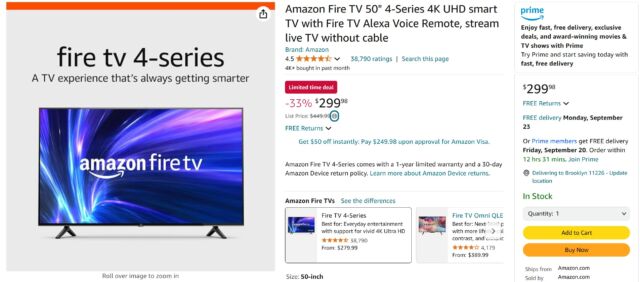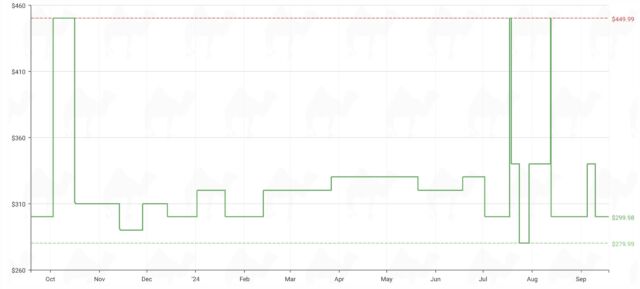
A lawsuit is seeking to penalize Amazon for allegedly providing "fake list prices and purported discounts" to mislead people into buying Fire TVs.
As reported by Seattle news organization KIRO 7, a lawsuit seeking class-action certification and filed in US District Court for the Western District of Washington on September 12 [PDF] claims that Amazon has been listing Fire TV and Fire TV bundles with "List Prices" that are higher than what the TVs have recently sold for, thus creating "misleading representation that customers are getting a 'Limited time deal.'" The lawsuit accuses Amazon of violating Washington's Consumer Protection Act.
The plaintiff, David Ramirez, reportedly bought a 50-inch 4-Series Fire TV in February for $299.99. The lawsuit claims the price was listed as 33 percent off and a "Limited time deal" and that Amazon "advertised a List Price of $449.99, with the $449.99 in strikethrough text.” As of this writing, the 50-inch 4-Series 4K TV on Amazon is marked as having a "Limited time deal" of $299.98.

Camelcamelcamel, which tracks Amazon prices, claims that the cheapest price of the TV on Amazon was $280 in July. The website also claims that the TV's average price is $330.59; the $300 or better deal seems to have been available on dates in August, September, October, November, and December of 2023, as well as in July, August, and September 2024. The TV was most recently sold at the $449.99 "List Price" in October 2023 and for short periods in July and August 2024, per Camelcamelcamel.

Amazon's website has an information icon next to "List Prices" that, when hovered over, shows a message stating: "The List Price is the suggested retail price of a new product as provided by a manufacturer, supplier, or seller. Except for books, Amazon will display a List Price if the product was purchased by customers on Amazon or offered by other retailers at or above the List Price in at least the past 90 days. List prices may not necessarily reflect the product's prevailing market price."
The lawsuit against Amazon alleges that Amazon is claiming items were sold at their stated List Price within 90 days but were not:
... this representation is false and misleading, and Amazon knows it. Each of the Fire TVs in this action was sold with advertised List Price that were not sold by Amazon at or above those prices in more than 90 days, making the above statement, as well as the sales prices and percentage discounts, false and misleading. As of September 10, 2024, most of the Fire TVs were not sold at the advertised List Prices since 2023 but were instead consistently sold well below (often hundreds of dollars below) the List Prices during the class period.
When contacted by Ars Technica, an Amazon spokesperson said that the company doesn't comment on ongoing litigation.
The lawsuit seeks compensatory and punitive damages and an injunction against Amazon.
“Amazon tricks its customers”
The lawsuit claims that "misleading" List Prices harm customers while also allowing Amazon to create a "false" sense of urgency to get a discount. The lawsuit alleges that Amazon has used misleading practices for 15 Fire TV models/bundles.
The lawsuit claims that in some cases, the List Price was only available for "an extremely short period, in some instances as short as literally one day."
The suit reads:
Amazon tricks its customers into buying Fire TVs by making them believe they are buying Fire TVs at steep discounts. Amazon omits critical information concerning how long putative “sales” would last, and when the List Prices were actually in use, which Plaintiff and class members relied on to their detriment. Amazon’s customers spent more money than they otherwise would have if not for the purported time-limited bargains.
Further, Amazon is accused of using these List Price tactics to "artificially" drive Fire TV demand, putting "upward pressure on the prices that" Amazon can charge for the smart TVs.
The legal document points to a similar 2021 case in California [PDF], where Amazon was sued for allegedly deceptive reference prices. It agreed to pay $2 million in penalties and restitution.
Other companies selling electronics have also been scrutinized for allegedly making products seem like they typically and/or recently have sold for more money. For example, Dell Australia received an AUD$10 million fine (about $6.49 million) for "making false and misleading representations on its website about discount prices for add-on computer monitors," per the Australian Competition & Consumer Commission.
Now's a good time to remind friends and family who frequently buy tech products online to use price checkers like Camelcamelcamel and PCPartPicker to compare products with similar specs and features across different retailers.



















